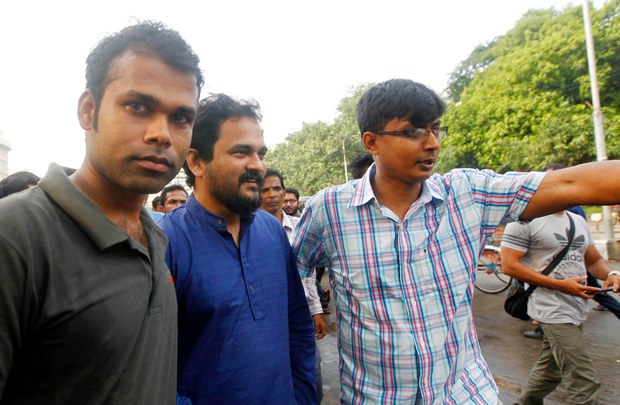Bangladeshi Police Briefly Detain Prominent Activist
2018.06.06
Dhaka
 Police in plain clothes take away Imran Sarkar (center, blue shirt) as his supporters prepared to stage a protest in Dhaka, June 6, 2018.
Police in plain clothes take away Imran Sarkar (center, blue shirt) as his supporters prepared to stage a protest in Dhaka, June 6, 2018.
Bangladeshi police detained and later released a leader of a secular movement that was preparing to protest stepped-up anti-narcotics operations, officials said Wednesday, while the prime minister vowed to sustain the crackdown that has killed at least 130 people.
The brief detention of activist Imran Sarkar took place the same day U.N. human rights chief Zeid Ra’ad al-Hussein condemned what he described as “extrajudicial killings” in Bangladesh since the government launched a “zero tolerance” campaign against illegal drugs three weeks ago.
Sarkar, a spokesman for the grassroots movement known as Gonojagoron Moncho (Mass Awakening Platform), was “invited” for questioning at the Shahbag intersection in Dhaka after defying warnings not to organize a rally without a permit, Lt. Col. Mohammed Emranul Hasan, a commander of the Bangladeshi police’s Rapid Action Battalion (RAB) wing, told BenarNews.
“There are more cases against him,” Hasan said, explaining that officials had warned Sarkar on Sunday not to pursue his well-publicized plan to hold rallies in the capital without prior permission from police.
Witnesses said members of RAB took Sarkar to a police vehicle, as members of his group tried to form a human chain to protest the bloody anti-drug campaign.
Hours later, Hasan told reporters that Sarkar had been released after undergoing interrogation.
In 2013, Sarkar, former son-in-law of Education Minister Nurul Islam Nahid, led mass protests at the Shahbag intersection calling for the execution of alleged war criminals from the 1971 Bangladeshi war of independence from Pakistan and a ban on religion-based parties in Bangladesh.
‘A total disregard for the rule of law’: UN official
Since mid-May, at least 130 drug suspects have reportedly been shot dead and about 13,000 arrested by security forces across Bangladesh, according to a statement issued in Geneva by the U.N. human rights chief.
“I am gravely concerned that such a large number of people have been killed, and that the Government reaction has been to assure the public that none of these individuals were ‘innocent’ but that mistakes can occur in an anti-narcotics drive,” Zeid said.
“Such statements are dangerous and indicative of a total disregard for the rule of law,” he said.
Every person has the right to life, he emphasized.
“People do not lose their human rights because they use or sell drugs,” Zeid said. “The presumption of innocence and the right to due process must be at the forefront of any efforts to tackle crimes.”
However, Prime Minister Sheikh Hasina, in a speech at her official residence Wednesday, vowed to carry on with pursuing a drug-free Bangladesh.
“The drives against militancy, terrorism and drugs will go on. We want to build a drug-militancy- and terrorism-free Bangladesh,” the local Daily Star newspaper quoted Hasina as saying. “There’ll be no room for injustice and unjust in the country.”
Hasina’s government launched the anti-narcotics campaign to tackle the spread of yaba, a cheap stimulant in tablet form that contains methamphetamine and caffeine. Authorities estimate that about 300 million yaba pills were smuggled into Bangladesh from neighboring Myanmar last year.
Bangladeshi rights activists and members of the political opposition have expressed fears that the violence could spiral into a campaign of mass killings similar to the Philippines, where rights groups say thousands of suspected drug users have been killed in alleged shootouts with police officers.
Responding to Zeid’s criticism, Bangladeshi Home Minister Asaduzzaman Khan Kamal told Reuters: “We are not killing anyone. Our forces are compelled to fire back when they are fired at. We’ll continue this drive to stamp out drugs to save our young generation.”
In his statement, Zeid also expressed concern that poor Bangladeshis were being targeted in the anti-drug campaign. Rights groups in the Philippines had said that slum dwellers were also mostly the victims of Manila’s anti-drug war.
During its Universal Periodic Review before the U.N. Human Rights Council on May 14, Bangladesh vowed to investigate reports of extrajudicial executions, arbitrary arrests and other serious violations, Zeid said.
“The developments since that date, with increasing reports of such human rights violations, are deeply worrying,” Zeid said.
The killings began the day after that review, the U.N. official noted.







